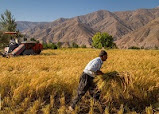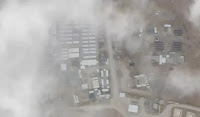Pakistan’s elections
held on February
08,
were meant to bring stability to the country after almost two years of
turmoil but the
outcome
of the polls has deepened political divisions. It will also bring more
instability to a nuclear-armed, 240-million strong country already shaky at
best in a critically important geostrategic region.
In the months leading up to the long-awaited elections, the
judiciary and the military pursued a dual track strategy: ensure that the highly
popular former prime minister, Imran Khan, is never able to run for
political office again and reinvigorate the political fortunes of Nawaz Sharif,
the three-time former prime minister and leader of the Pakistan Muslim League
(Nawaz).
Following his loss of power in a parliamentary vote of no
confidence in April 2022, Khan was relentlessly pursued by the judiciary which
eventually handed him three sentences for corruption, leaking state secrets and
an illegal marriage, for a total of 24 years. He was barred from politics and
sent to gaol. His Pakistan Justice Movement (PTI) was disbanded, its electoral
symbol (the cricket bat) outlawed, and its members banned from running as PTI
members.
Nawaz Sharif—a convicted corrupt politician who’s had
an ambivalent relationship with the army for 40 years, was brought back from a
four-year self-exile in London as an alternative to Khan. Soon after Nawaz’s
return to Pakistan the corruption charges he faced were dropped and
his life ban from politics was lifted.
The path was now clear for his smooth return to power.
However, what was meant to be a walk in the park for Nawaz and the PML(N)
turned out very differently on election day. The millions of pro-Imran Khan
supporters were not interested in singing off the score sheet handed over to them.
Even with all the measures taken to ensure there was no
level playing field, and the ballot stuffing at a number of polling
stations, the PML(N), was only able to win the second largest number of seats
(75).
The
former PTI members—running as independents—won the largest number of seats,
93 of the 266 up for grabs. The independents’ total seats could increase as
they are contesting the result of over a dozen others they claim have
been stolen from them. Nevertheless, Nawaz declared victory, and will try—with
great difficulty, to form a coalition government with the Pakistan
People’s Party (PPP) of the late Benazir Bhutto. The only bond between the
PML(N) and the PPP is that their hatred of each other is slightly less than
their hatred of the PTI.
International reaction to these elections,
including from the US, the UK and the EU, was negative, with several
countries calling for investigations into the allegations of vote-tempering and
pre-poll obstructions. The Australian government also made it clear that that
it was concerned that ‘the Pakistani people were restricted in their
choice, since not all political parties were allowed to contest these
elections’.
Notwithstanding the evidence to the contrary, much of it
posted on social media platforms even though mobile internet connections were
restricted, the Chief of Army Staff, General Asim Munir, commended the
Electoral Commission for running such a successful election and stressed the
significance of free and unhindered participation by Pakistani people in
exercising their right to vote.
Similarly, the caretaker prime minister, Anwaarul Haq
Kakar, believed that the ‘nation had accepted the results’ and the
country needed to move on. Moreover, he brushed aside international
criticism of the elections as ‘not that big a deal’.
Despite the compromised nature of these polls, a PML(N)-led
coalition government is the most likely—but not certain—outcome of the
elections. According to the latest reports, it would be led by Shehbaz
Sharif, Nawaz’s younger brother who was prime minister after Khan was ousted in
April 2022.
The
real power will still be held behind the scenes by Nawaz Sharif. Given the
fragility of the coalition, which will include smaller parties and
non-PTI-leaning independents, this will be a weak government with little
legitimacy. This is unfortunate given that whoever is prime minister will have
to make some particularly difficult decisions on the economy, handle adroitly
the country’s foreign relations, and manage a growing terrorist threat.
Pakistan is an economic mess, with 40% of the
population living under the poverty line, an inflation rate that has hit 30%, a
rupee whose value has halved in 10 years, and barely enough foreign exchange to
cover the cost of imports for a month or so.
The country avoided economic meltdown in August 2023 by
securing a standby arrangement of US$3 billion with the IMF. However, this
bailout runs out in March and a new one—the 24th in Pakistan’s
history—will need to be negotiated.
The IMF will undoubtedly demand that the
government implement more austerity measures, including continuing to reduce
subsidies on essential commodities. Imposing draconian economic measures on an
already struggling population will not be easy, particularly given Nawaz’s lack
of popular support. We can expect serious social unrest down the road.
A Shehbaz-led government will also have to deal with
the growing terrorist threat, mainly but not solely from the
Afghanistan-based Pakistan Taliban (TTP), which has continued to increase since
the Taliban took over in neighbouring Afghanistan in August 2021. Pakistan has
repeatedly demanded that the Taliban government of Afghanistan cease to support
the TTP. But the Taliban isn’t about to turn on the TTP, an organisation with
which it has deep ideological, operational, historical and tribal links. Kabul
also knows that the Pakistani military doesn’t want to escalate this issue by pursuing
the TTP unto Afghan territory. Moreover, given Pakistan’s poor fiscal position,
it cannot afford another expensive military operation. Accordingly,
Pakistan-Afghan relations will probably continue to be frozen, and the scourge
of terrorism to fester.
This will not be well received by the leaders in Beijing who
persistently press Pakistan to do more against the terrorists roaming the
countryside regularly killing Chinese workers and officials working on
the US$60 billion China-Pakistan Economic Corridor (CPEC). Pakistan
already has some 10,000 security personnel dedicated solely to the protection
of Chinese interests in Pakistan. Still, relations with China will continue on
an even keel or even deepen. It was after all under Nawaz’s third stint
(2013-2018), that CPEC started.
Pakistanis
can expect Indo-Pakistan relations to possibly improve. The personal dynamics
between Nawaz and Indian PM Narendra Modi have been good in the past.
Nawaz attended Modi’s 2014 inauguration and Modi visited Nawaz in
Lahore in December 2015—the first visit by an Indian leader in more than a
decade. But while Nawaz would probably be interested in improving relations
with Delhi, it was the perception that he was warming up too much to the
Indians when he was in power which critically contributed to the military
orchestrating his downfall in 2017. Shehbaz, under the guidance of Nawaz, is
unlikely to make the same mistake.
Despite Washington’s public criticism of
Pakistan’s seriously flawed election, the Biden administration is committed to
‘strengthening its security cooperation’ with Islamabad regardless as to who
eventually becomes prime minister. Pakistan continues to be a valuable regional
partner, being in a unique position to monitor developments in Afghanistan.
Finally, whilst Washington may have had issues with the
election process, it will absolutely not miss Imran Khan, who repeatedly accused
the US of having been instrumental, with the help of Pakistan’s military,
in his downfall in April 2022.
US Secretary
of State meeting with
General Asim Munir—the man who effectively runs Pakistan, in Washington only a
few weeks before the elections only reinforced this common perception in
Pakistan. However, given Munir’s massive miscalculation on the elections, his
days may well be numbered.
How long the next prime minister will last in office is
anyone’s guess, but given that no prime minister has ever completed their term
in Pakistan’s 75-year history, it
is suspect the odds are poor that Shehbaz Sharif will break that
tradition.
Courtesy:
The Strategist



















